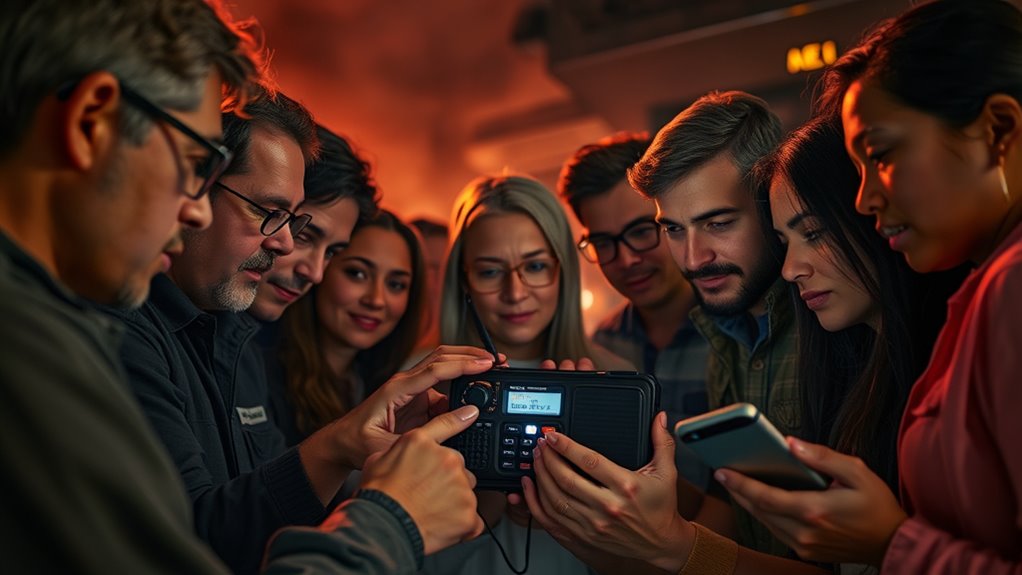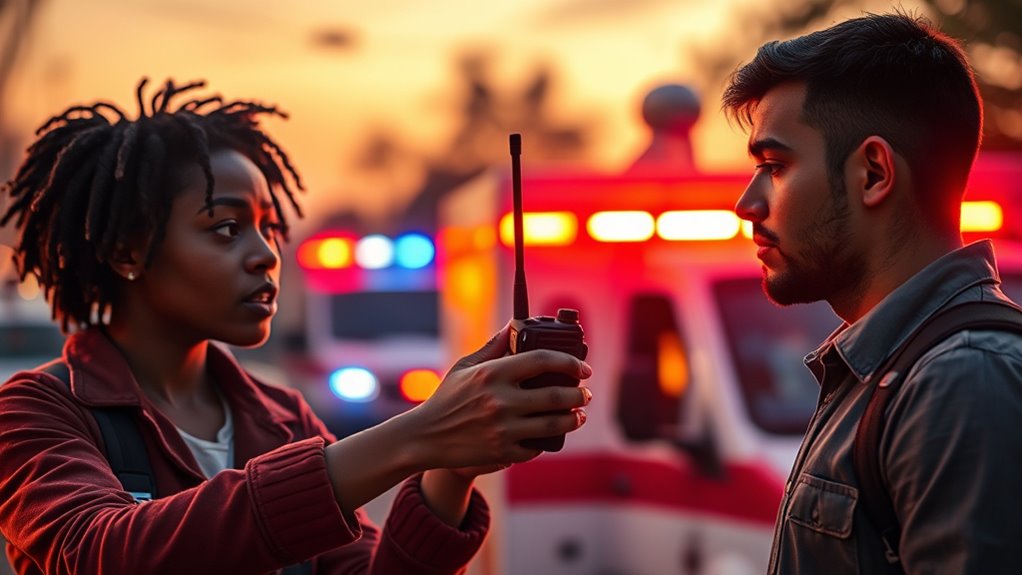During a crisis, it is essential to stay connected through reliable methods like walkie-talkies or satellite phones, especially if traditional channels fail. Use clear, calm language and establish designated meeting points to avoid confusion. Community support plays a vital role; share updates and listen actively to foster trust and reassurance. Preparing these strategies in advance helps everyone feel more secure. If you’re interested, learn more about effective ways to keep communication open and foster resilience during emergencies.
Key Takeaways
- Establish pre-arranged backup communication methods like walkie-talkies or satellite phones for reliable contact.
- Use clear, calm language to share information and reassure others during the crisis.
- Designate trusted individuals as points of contact to coordinate updates and support.
- Foster community connections through face-to-face check-ins or local groups to maintain emotional support.
- Provide consistent safety information and encourage mutual support to reduce confusion and build resilience.

Have you ever wondered what happens when disaster strikes and conventional communication methods fail? It’s in those moments that staying connected becomes a essential part of managing the crisis, especially when it comes to supporting mental health and relying on community support. When traditional channels like phone lines or internet services go down, you need to think creatively about how to keep everyone informed and emotionally supported. Maintaining mental health during a crisis isn’t just about individual resilience; it also depends heavily on community support and collective effort. Knowing that others are there, sharing concerns, and offering reassurance can make a huge difference in how you cope with uncertainty. This means establishing backup communication plans before an emergency occurs, like using walkie-talkies, satellite phones, or even face-to-face check-ins when possible. These methods can help you stay connected with loved ones and neighbors, ensuring that nobody feels isolated or forgotten. Community support plays a fundamental role here—not just in relaying information, but in providing emotional comfort. When people come together, whether through neighborhood groups or local associations, they create a safety net that bolsters everyone’s mental health. It’s important to designate a few trusted individuals who can serve as points of contact, especially if communication networks are compromised. Sharing updates, listening to each other’s concerns, and offering encouragement can help everyone stay grounded amid chaos. You should also remember that clear, calm communication is key. When you talk with others, focus on speaking gently and clearly, avoiding panic or misinformation that can escalate anxiety. Encourage others to do the same, fostering an environment of calmness and mutual support. If you’re in charge of coordinating efforts, consider setting up designated meeting points or check-in routines so that everyone knows where and when to gather. This can help reduce confusion and ensure that community members are aware of safety updates or available resources. Additionally, supporting mental health in these moments means acknowledging feelings of fear or frustration without judgment. Listening actively and validating emotions can help others process their worries and feel less alone. Building a sense of community support before emergencies happen prepares everyone to handle the stress better and creates a more resilient network. Remember, in a crisis, communication isn’t just about passing on information; it’s about fostering connection, reassurance, and trust. By prioritizing mental health and community support, you help create an environment where everyone feels safer and more capable of weathering the storm together. This collective strength can be the difference between chaos and coordinated resilience, proving that even in the toughest times, talking through a crisis with care and support keeps hope alive. Additionally, understanding the importance of emergency communication strategies can significantly enhance your preparedness and response efforts.
Frequently Asked Questions
How Can I Prepare My Family for Emergency Communication Failures?
To prepare your family for emergency communication failures, create clear family emergency plans and involve everyone in communication drills regularly. Practice alternative ways to stay in touch, like designated meeting spots or using text messages. Make certain everyone knows emergency contacts and has access to backup communication tools. These steps help build confidence, so your family stays connected and prepared, even if typical communication channels fail during a crisis.
What Are the Best Apps for Emergency Communication?
When choosing the best apps for emergency communication, you look for reliability, ease of use, and coverage. Satellite phones keep you connected when traditional networks fail, providing direct communication regardless of location. Emergency alert apps send instant notifications, keeping you informed and prepared. You want apps that work offline, synchronize with emergency services, and offer real-time updates. These tools ensure you’re ready, resilient, and connected no matter what crisis unfolds.
How Do Language Barriers Affect Crisis Communication?
Language barriers can profoundly impact crisis communication by creating misunderstandings due to cultural differences and translation challenges. You might miss important cues or give confusing instructions, which can hinder effective response. To overcome this, you should use clear, simple language and rely on translation tools or bilingual responders. Recognizing cultural differences helps you tailor your message appropriately, ensuring everyone understands essential information quickly during a crisis.
What Should I Do if My Phone Battery Dies During an Emergency?
When your phone’s power plummets, don’t despair—stay strategic and save your signal. Prioritize battery conservation by turning off unnecessary apps and features. Seek out alternative devices like a portable charger or a landline if available, and remember to keep emergency contacts memorized or written down. Staying calm helps you focus, ensuring you can still communicate clearly and confidently, even when your device dies.
How Can I Ensure Elderly or Disabled Individuals Understand Emergency Messages?
To guarantee elderly or disabled individuals understand emergency messages, focus on accessible communication methods. Use clear, simple language and visual alerts like flashing lights or signs that grab attention. Offer multiple ways to receive information, such as large-print notices or audio messages. Make sure your message is easy to understand and accessible for everyone, so they can respond quickly and stay safe during emergencies.
Conclusion
So, next time disaster strikes, remember: your calm, clear words could be the difference between chaos and control—unless, of course, you prefer chaos. Practice your emergency talk now, or risk turning a crisis into a comedy of errors. Because nothing says “trust me” like confusion, right? Stay prepared, stay sane, and maybe invest in a megaphone—just in case. After all, who doesn’t want to be the hero with the loudest voice?










